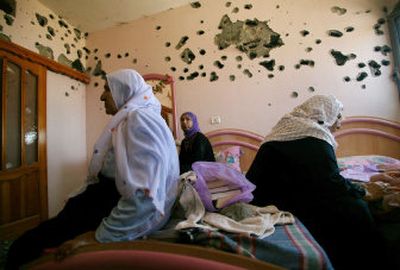Israel, Hamas closer to truce

GAZA CITY, Gaza Strip – Israel and the Hamas-led Palestinian government expressed hopes Saturday of arranging a cease-fire to end their bloody two-week-old confrontation over the capture of an Israeli soldier.
Israeli troops and armor also pulled back from a swath of northern Gaza they had held for two days, although military commanders warned they could re-enter the area at any time to quell rocket fire by Palestinian militants. Israeli forces remained dug in at a disused airport in the southern Gaza Strip.
The calls for a cease-fire came from Palestinian Prime Minister Ismail Haniyeh, who is a senior Hamas official, and from an Israeli Cabinet minister, Ophir Pines-Paz, who raised the possibility of a comprehensive accord that would free the captured Israeli and halt rocket attacks by militants.
It marked the second day in a row that a senior Israeli official has spoken publicly of the prospect of some compromise in the standoff over the abducted soldier, Cpl. Gilad Shalit, who was seized in a cross-border raid on June 25.
Both sides have powerful incentives for finding a negotiated solution, but serious obstacles remain to any agreement. With thousands of Israeli troops and heavily armed Palestinian guerrillas in close proximity close to densely populated areas of Gaza, conflict could flare again at any moment.
And if the young soldier were killed by his captors, Israel almost certainly would unleash a prolonged and punishing onslaught. Israeli officials say they believe he is still alive and unharmed except for minor injuries suffered during the raid, which killed two other Israeli soldiers.
Although Israel appears to be dropping its insistence that it will not trade Palestinian prisoners for Shalit, the government of Prime Minister Ehud Olmert said Saturday that the soldier’s safe return must precede any concessions on Israel’s part. A day earlier, Cabinet Minister Avi Dichter had spoken of freeing Palestinian prisoners as a “reciprocal gesture” if Shalit’s captors release him.